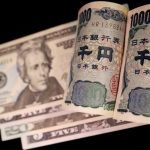
(Reuters) -The U.S. dollar edged up while the yen remained around its multi-month low on Wednesday ahead of the Federal Reserve policy meeting and after the Bank of Japan (BOJ) raised interest rates for the first time in 17 years.
Analysts said the yield differential between U.S. Treasuries and Japan’s government bonds, which remains stark, will keep leading the yen after flagging that the Japanese currency had already given up the pre-BOJ policy meeting rise.
A potentially hawkish Fed Open Market Committee poses further downside risks to the Japanese currency, which could trigger a fresh round of verbal intervention.
Barclays and BofA recently flagged so-called intervention levels from 152 to 155 yen to the dollar. BofA recalled that the U.S. dollar had not reached 152 yen since 1990, after failing to break that level in October 2022 and November 2023.
While investors expect the Federal Reserve to keep rates unchanged at its policy announcement on Wednesday, Fed officials’ signals could get more hawkish about the timing and extent of any easing this year in a move designed to tame stubborn inflation.
“If the yen falls further from the current levels, I expect some verbal intervention from Japanese authorities to support the currency,” said Athanasios Vamvakidis, global head of forex research at BofA.
On Wednesday, the yen was down 0.4% after weakening to a four-month low of 151.58 per dollar.
It hit in 2023 a multi-decade low of 151.92.
“If we are incorrect on that (a reasonably balanced Fed communication tonight), then the forex could get interesting as a hawkish (Fed) communication could see Tokyo’s resolve over limiting yen depreciation being tested,” said Derek Halpenny, strategist at MUFG Bank.
“A Tokyo holiday could exacerbate a move higher (of the dollar), and a breach of the 2023 high is certainly feasible,” he added after flagging that it’s Vernal Equinox Day in Japan.
The yen weakened, and Japanese government bond yields fell after the BOJ announced on Tuesday that there would be an exit from years of ultra-easy monetary policies.
“The BOJ decided for a dovish exit from its negative rates policy. They raised rates but for now they are staying there. Meanwhile they will continue buying the same amount of bonds,” BofA’s Vamvakidis argued.
The yen’s drop was broad-based, with the currency weakening to 164.71 against the euro, its lowest since 2008, while against the pound, yen slipped to 192.84, its lowest since 2015.
Low Japanese rates have made the yen the funding currency of choice for carry trades, in which traders typically borrow a low-yielding currency to then sell and invest the proceeds in assets denominated in a higher-yielding one.
The Australian dollar touched a more than three-week high on the yen at 98.99.
“The carry trade versus the major currencies continues to be in play and is expected to continue for a while,” said Daniela Hathorn, senior market analyst at Capital.com. “This means the yen is likely to see further weakness, especially if the other central banks continue to delay cutting rates.”
The dollar index, which measures the U.S. currency against six rivals, was 0.12% higher at 103.99. The euro last bought $1.0846.
Last week’s stronger-than-expected inflation reports led traders to further reduce their bets on Federal Reserve rate cuts this year, with markets now pricing in 73 basis points (bps) of easing this year. At the start of the year, traders were pricing in 150 bps of cuts.
The Aussie eased 0.15% to $0.6519, a day after Australia’s central bank held interest rates steady as expected, while watering down a tightening bias to say that it was not ruling anything in or out on policy.
In cryptocurrencies, bitcoin last rose 1.6% to $61,569, having touched their lowest in two weeks of $60,760 earlier in the session.
To read the full article, Click Here

